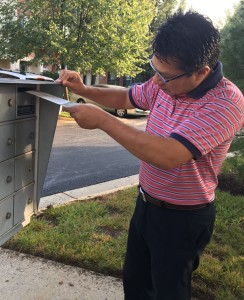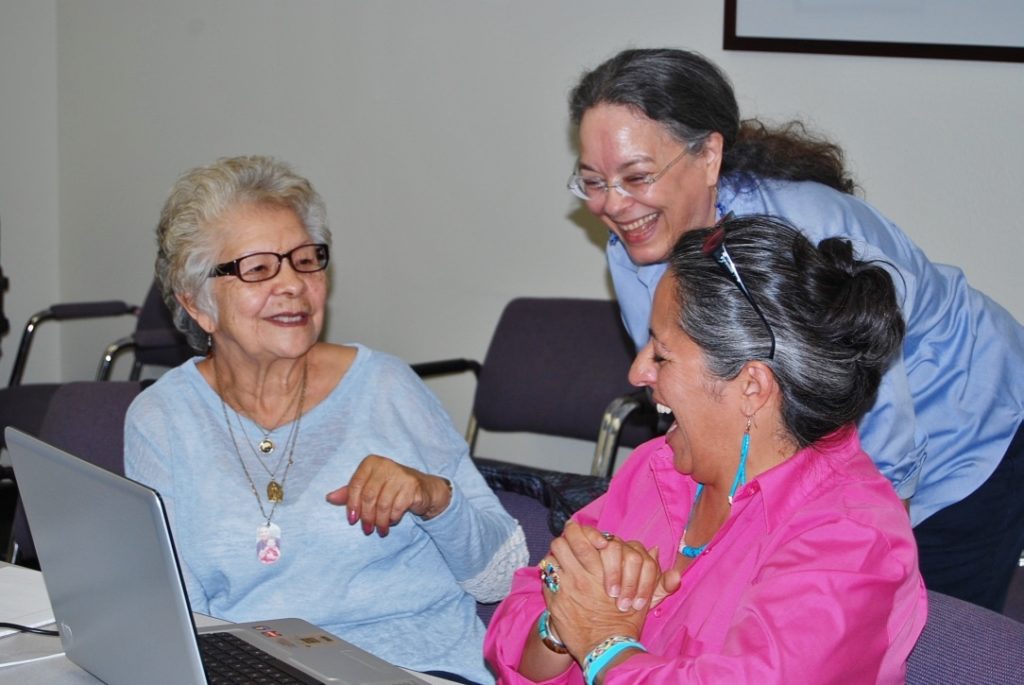Earlier this week, I attended a virtual town hall hosted by ColorOfChange.org, which brought together hundreds of people from around the world to learn and share the many ways in which communities of color will be pushing back against unfavorable changes in the political and social climate of this country. I was really inspired by the collective power of so many activists, advocates, allies, and community members getting together – without having to leave their houses! – to strategize and support one another. I also noticed that during the town hall, as participants were typing and chatting with each other, that a number of people identified themselves as Baby Boomers or Elders who wanted to get more involved in the fights to protect their communities. One person note that she is homebound and unable to volunteer outside of her house or participate in protests, but still wanted to take part in the movements that are shaping our future.

Marcos Bautista sending his comments to ACL. Photo courtesy of NHCOA.
The Diverse Elders Coalition launched our civic engagement campaign earlier this year with that very goal in mind: getting elders of all ages, identities, classes, abilities, and locations involved with the programs and processes that impact their lives. We collected nearly 5,000 comments from individuals in all 50 states about the unique and unmet needs of American Indian/Alaska Native elders, Asian American, Pacific Islander American and Native Hawaiian elders, Black and African American elders, Hispanic elders, and LGBTQ elders. Those comments were submitted to the Administration for Community Living (ACL) along with a statement from our coalition, urging the ACL to incorporate our findings from these comments into their planning guidance for aging programs.
This campaign has been so inspiring to me, not only because of the incredible impact of our communities working together, but also because of how many people we were able to engage. Our members submitted comments both in-person and via the Internet; materials were distributed and comments were collected in six different languages, including English, Spanish, Korean, Mandarin, Vietnamese, and Hmong. And it wasn’t just elders who shared their stories with us: children, grandchildren, caregivers, and community activists also told us about the needs of the older adults in their lives. When we pool our resources and collaborate with each other, anything is possible.
Which brings me back to this virtual town hall that I had joined. It’s not always easy for people to get out of their homes and pound the pavement, particularly older adults in our communities, who may live alone, have difficulty accessing transportation, and/or struggle with illness or disability. But there are so many opportunities for us to connect through the internet. We are seeing proposals from members of Congress that will negatively impact our communities: large-scale deportation of immigrants, a Muslim registry, repeal of the Affordable Care Act, cuts to Medicare and Social Security. Our coalition will continue to push back against policies that hurt elders of color, American Indian/Alaska Native elders, and LGBT elders, and we will work to find innovative ways – including through phone- and internet-based advocacy – to get elders involved in these fights as well. After all, more older adults than ever are using the internet and social media to stay connected. Why not stay connected to community organizing and political advocacy efforts, too?

Elders participating in a digital storytelling workshop at NICOA. Photo courtesy of NICOA.
Some of our member organizations have already begun to do this. For example, the Southeast Asia Resource Action Center (SEARAC) is hosting a series of monthly community calls, which bring together people from anywhere in the country to talk about the issues that impact Southeast Asian Americans. Anyone can join; all you need is internet access and a phone. And as we head into 2017, the Diverse Elders Coalition will want to connect our partners and community members with their Congressional representatives as well as with each other to ensure that we have as many voices as possible speaking up for the needs of diverse older adults. Stay tuned to our blog, as well as our Facebook and Twitter pages, for action alerts and important news. And if you have suggestions for how we can help you get involved, feel free to contact us!
The opinions expressed in this article are those of the author and do not necessarily reflect those of the Diverse Elders Coalition.

